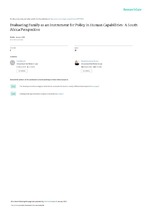| dc.description.abstract | The capabilities" approach has overtime offers instructive insights into the improvement of human capabilities in various fields such as behavioural change, social inequalities, poverty, unemployment, and education. To this end, the capability approach may influence the achievement of social cohesion in the family. The family is an important unit that may be used to inform social policies and aid social cohesion. This article evaluates the use family as an instrument of policy in drawing out human capabilities. First, it defines and unpacks a family in South Africa"s context. Secondly the value addition that a family adds as an instrument for policy is done. Thirdly, the concept of human capabilities with the aid of the capabilities approach is done. The final step is a qualification of the capabilities approach in South Africa"s context. A conclusion and recommendations follow. The article utilised secondary data to evaluate how policies on family impact human capabilities in South Africa by aid of capability approach. | en_US |

